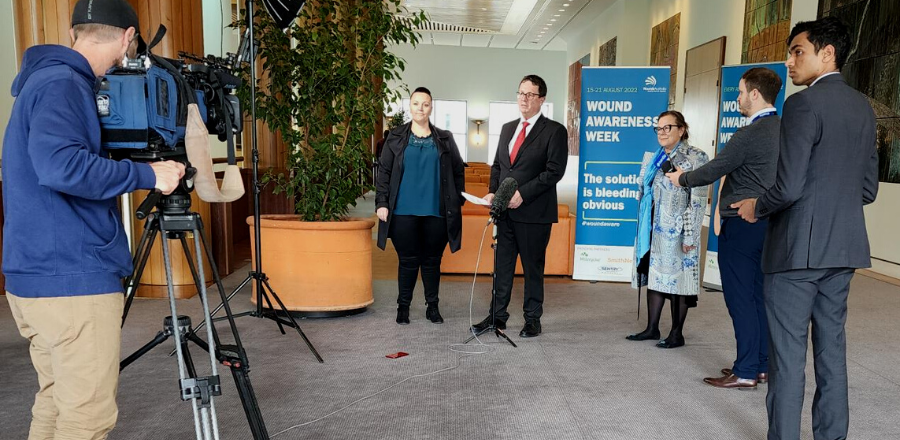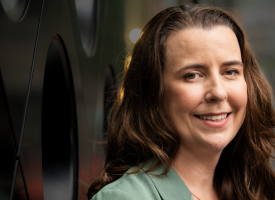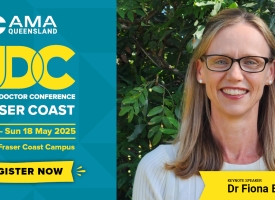AMA President Professor Steve Robson launches new wound care report
STEVE ROBSON: Well, I want to begin by acknowledging the traditional owners of the land that we're all gathered on here today. We're on Ngunnawal country. I pay respects to any Indigenous Australians present here and acknowledge elders and leader’s past, present and emerging.

We're talking about something incredibly important today, something that affects almost half a million Australians at any given time and costs the health budget something like $3 billion a year. So, this is an important topic, and we're talking about wound care. The issues that we're talking about have an enormous effect on people's quality of life, on their mobility and their ability to work and their mental health, obviously, from all of these other issues.
So obviously chronic wounds need constant care to heal properly. But at the moment, Medicare will allow a GP to bulk bill for a consultation. If they do that, they can't charge for any of the consumables or dressings that are used as part of the care. So, there's significant reform that the AMA is going to be talking along with the other people at the press conference here, Wound Care Australia.
So, one of the issues with cost is that Australians who are facing chronic and regular checks for dealing with wounds, and paying for the costs of dressings often, will face enormous financial pressure as well, and that makes it more likely that they will, for example, skip care or will not go to have wound dressings, so it puts them at risk of complications occurring from wounds. And these can be extremely serious. In the worst possible cases, patients can end up with amputations if the wounds are not managed properly.
So, these are not minor things that we're dealing with and talking about here. In fact, in Australia there is of the order of 32,000 admissions to hospital every year for wound complications. In fact, the figure is close to a quarter of a million patient days from wound complications in hospital, and a likely yearly spend of $350 million. So, these are major, major imposts on Australia's health resources and funding.
So, the AMA is working on a proposal that we hope will cost as little as $23 million for the government over four years, but likely to see a return of close to $200 million on investment. So that means $1 spent on these proposals is likely to return almost $9 in savings across the health system for the government.
So, our proposals have five elements. The first is a Commonwealth funded scheme to cover the cost of wound dressings and consumables in a roll out process - initially for people, for example, who have concessions and so on, but ultimately, we hope rolled out for the whole community. A stepped care model similar to that with conditions such as arthritis or diabetes, where different levels of care are required then brought to bear. And this hopefully will play into modernisation of Medicare, giving the patient a home and allowing a general practice to assemble resources around a patient. We're proposing three new Medicare item numbers to allow, for example, inclusion of other health professionals in what we're doing here and freeing up GP time. We know it's difficult to see GPs, so we're hoping that this will allow assembly of a group of multidisciplinary people providing wound care. We want a national scheme to educate and upskill all of the people involved in providing wound care at the moment and linking funding to people completing these educational modules. And we really want a sector wide national program to reduce the duplication of effort in wound care at the moment.
So, the AMA obviously is not the only organisation calling for reform in wound management in Australia, with a serious GP workforce pressure in overwhelmed public hospitals, we're hoping that from our perspective that we reduce strain on other sectors at the moment. And I'm going to hand over to this point- Wound Awareness Week Ambassador. Professor Fiona Wood, who I'm sure is known to many of you. She's a former Australian of the Year and one of the most innovative surgeons and clinicians globally - who's better placed to talk to us? So, Professor Wood.
FIONA WOOD: Thank you very much. I think skin is something that we take for granted. It doesn't take much to breach that skin, for a wound to develop, and it to become a life-threatening issue. As we've heard, almost half a million people at any one time in Australia will have a wound that requires treatment. In my life as a bone surgeon, and if I tell you that prevention is better than cure, you absolutely understand that. Well, in this space, the same applies. Wounds really need attention. They need the spotlight because we find them in all sorts of different places. People manage it on their own, in primary care, in all sorts of clinics in our hospitals, rheumatology, dermatology, and it's all scattered around.
We know that there's been research and advances and innovation in wound care over these last 40 years that I've been working in this space that is extraordinary. Well, we need to bring everything together. We need to understand the skin as an organ is as relevant to you as your heart is. We need to understand prevention is better than cure and accurate assessment, education of our community, of our healthcare professionals all the way through, is vital. The same information, given the same approach, with a level of understanding of what treatment is required for what particular wound in what particular patient.
So, putting all this together has a huge impact to the individual. Certainly, if you look at just pressure sores; I mean, each year, there's $1 billion in treatment over pressure sores alone. Prevention's better than cure, again. So, let's bring us all together. Look at the lifestyle choices made. Look at wellness. Look at actually prevention in the community, empowering our community, empowering our health professionals, linking with technology to deliver excellence in wound care into the future. And we can only do that together by collaboration between all those people of vested - and there's nobody more vested than the person who has that painful, odorous wound on their body. Well, let's bring this whole thing together, the personal cost and the economic cost, and understand how excellence isn't about more in the long run. It's about an investment in our patients, an investment in our system, an investment into a better future for everyone. So, I'd like now to ask Hayley to follow up.
HAYLEY RYAN: Thank you. Thanks, Fiona. Hayley Ryan, Board Chair of Wounds Australia. Look, we absolutely support the initiative that the AMA are looking to do. We know that 420,000 people at any one time are affected by wounds, and it does cost around $3 billion. So, there's the economic burden, but there's also the burden to the actual person: what are they suffering from? We know that wounds can actually lead to death. We know that wounds can lead to amputations. So, with Wounds Australia what we want to focus on is our 11-point plan. It's a very clear blueprint for what we want to achieve, some of which the AMA has already mentioned. How do we get MBS items on the map? How do we start looking at education and training, so that we can support the clinicians out there to provide the level of care needed to actually prevent a wound from happening, and also to treat it appropriately? We also want a national wound scheme so that we can actually focus on this very much a silent epidemic. And with that, we hope that- to bring you all along to the journey, working in with the AMA as well.
QUESTION: What have discussions been like with the health minister at this stage? Have they been productive on this sort of thing? Is there an appetite for change?
STEVE ROBSON: I think we have an enormous opportunity at the moment to work with a new minister, a new government, to modernise the way that we run Medicare and that we do things in this country and look at how we can improve. And wound care is an incredibly important area of care. Something like one in seven of every procedure done in the general practice involves wound care. So, there's an enormous opportunity to really modernise things and make a lot of Australians lives better if we get this right.
QUESTION: Have you had conversations as well about the upcoming budget, that purse strings are going to be very tight? What's the message that you've given to him about health funding?
STEVE ROBSON: The message that I've given, speaking to the Commonwealth Health Minister, is that spending on health is not a cost, it's an investment, and that if we invest in the health in the country, the rest of the economy will reward the government. So, we're very much about seeing health in this investment. We recognise their financial pressures, but this is a fantastic example in wound care of how small investments can lead to very, very big rewards across the health system.
QUESTION: Just on some of the issues of the day around health, obviously there's announcement today that we're a step further to securing mRNA vaccines. What is your reaction to that? And also, what is the AMA's key priorities in terms of- obviously, it appears we may have gone through this COVID wave, but there may be another one on the precipice as well?
STEVE ROBSON: Okay. So, I think many, many Australians in many areas have noticed that there have been big shortages of critical medications and critical health supplies at the moment. And that speaks to the fact that Australia is at the end of a very long logistic chain. The AMA is very, very interested in improving sovereign capacity to manufacture so many surgical supplies and medications and things right here. And we could be a hub for the Pacific. So, the idea that we're manufacturing vaccine here is fantastic and we hope it expands to lots of other critical medical things for Australians' health.
QUESTION: And just one more as well. We've heard over this weekend that the former prime minister, Scott Morrison, actually swore himself in as Health Minister. Was the AMA aware of that arrangement in the dealings with the previous government?
STEVE ROBSON: Look, I'm the new AMA President. I've been in the job for just on two weeks. We're actually focused on working with the current health minister and fixing problems now, and we're not really looking in the rear vision mirror at this point.
QUESTION: Do you think, though, that that arrangement should have been made public?
STEVE ROBSON: I think that's a matter for the Government. That's politics. The AMA is not about politics. We're about health.
QUESTION: So, you talk about the impact, what will the impact of taking up this initiative have for people who you look after, your patients? What's the value for them? Not just obviously in terms of what money they will save as well, but also psychologically as well?
FIONA WOOD: I think certainly psychological impact of chronic wounding is underrated. And I think we could- we see that any chronic health condition has a secondary mental health impact. And any way to reduce that is certainly positive. And again, it reduces the burden of disease on our whole community as well as on that individual.
QUESTION: And have your discussions with the department also been productive on this?
FIONA WOOD: Last year at the wound’s awareness week, we spoke with Greg Hunt.
QUESTION: Former minister.
FIONA WOOD: Minister Hunt, yes. Last year. So, speaking to the health minister last year, it was a very positive- it was received very positively. But of course, things change. And I think it's really important that we have a level of awareness across politics, but also across our community. It is making this discussion, one that people care about. And it doesn't take much to look around and see who is suffering to then understand why that caring matters.
QUESTION: So, what do you say to people who are looking to break the stigma? What's the best way to talk about this and sort of touch on this in a sort of sensitive way?
FIONA WOOD: Absolutely. Actually, making sure you have a discussion, make sure you escalate it, make sure we actually collaborate together. Because I think it's - we've talked about the financial impact on the large scale, but the suffering is not insignificant. And this is an investment. Investments in health are investments in our future, maintaining contribution and reducing the burden.
QESTION: So just talk about some of the people that you've been working with.
HAYLEY RYAN: So, I have various amounts of patients. They range from six months old up to 107 years old that all live with a wound. You mentioned about mental health. I want to throw in there that now you throw in an actual pandemic, two and a half years where people are isolating a lot more and we're starting to see mental health really impact. Not only that, but they’re also delaying getting health care and delaying getting support for their wound management. And the consequence of that is we're seeing delayed wounds. And now I've never seen so many amputations before in my career of 22 years. So, there's a human impact.
There is a patient I have at the moment a beautiful young lady, 28 years old. She was bitten a number of years ago by a redback spider. That redback spider actually placed her into the ICU for a number of days and the wounds have progressed for many years. We're now on a directory of healing, which is fantastic, but it's taken that long.
Now, this lady is- also has three young children and is breastfeeding. So, the human factor there is that a mother who is trying to breastfeed whilst having a terrible wound on her arm. Consequent is major pain to her as well. She's on lots of medications to try and support that. So, the human element is real and that is why with Wounds Australia we've got to get out there with how we collaborate better as a multidisciplinary team with our doctors and other professionals like Allied Health. But also, how do we also educate the actual consumer?
How do we tell them to get early referrals? Don't wait. I think one of the things that a lot of consumers and patients do is they injure themselves and they want to fix it themselves. And so, it's not until years later that they think, well, maybe I should get help. So that's the human element.
QUESTION: So that's very much the message that you want to send to everyone as well?
HAYLEY RYAN: Absolutely. To Wounds Australia, the solution is bleeding obvious. If we get on top of it now, we go to our 11-point plan, we implement all those things on that plan. We want to partner with government bodies. We want to work with you to get the best solution in the outcome for the patients that we care for.
QUESTION: Okay, all good. Thank you so much.
HAYLEY RYAN: Thank you.



